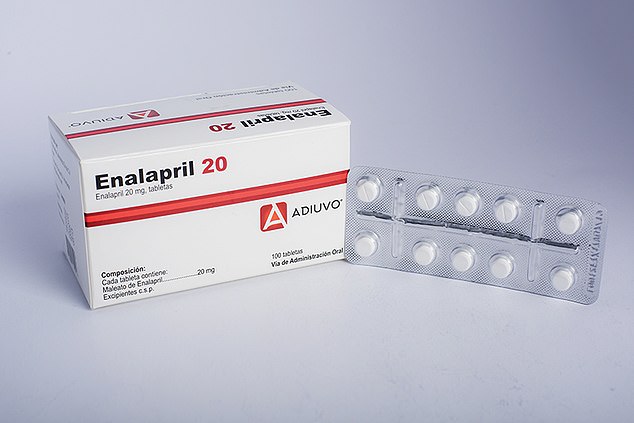A mini tablet that dissolves in the mouth in six seconds could radically improve the treatment of heart failure in babies and young children.
The tablet measures just 2 mm across — barely the width of a peppercorn — and contains the commonly used drug enalapril, which lowers blood pressure and bolsters blood flow to the heart.
It can be popped into the mouth without the child noticing, such as while they sleep, where it disperses in saliva before being swallowed.
Researchers hope the fast-disappearing tablet — called Aqumeldi — will improve compliance among younger children with heart failure who struggle to swallow pills, leading to fewer symptoms such as breathlessness and slow growth.
Around 1,400 babies a year in the UK develop heart failure, where the heart becomes too weak to pump blood around the body.

The tablet measures just 2 mm across — barely the width of a peppercorn — and contains the commonly used drug enalapril (Stock image)

Around 1,400 babies a year in the UK develop heart failure, where the heart becomes too weak to pump blood around the body (Stock image)
This is almost always due to congenital birth defects, such as structural abnormalities in the heart which mean it’s not able to circulate blood properly.
As a result, vital organs, muscles and tissues are starved of oxygen.
Drugs commonly used to treat heart failure in adults include beta blockers to slow the heart and stop it from burning itself out; diuretics to help get rid of excess fluid in the legs and feet that accumulates during heart failure; and medicines to dilate blood vessels and lower blood pressure, easing pressure on the heart.
But many of these are large tablets that children struggle to swallow. Plus, testing of them has largely been done in adults, while trials in children have been few and far between (partly because the numbers affected are lower and because of the ethics of giving experimental medicines to infants).
One solution has been to cut adult pills into bits to provide smaller doses for young children. But this makes it difficult to get an accurate and safe dose, which means the medication might not be effective, or could trigger side‑effects.
A child-friendly form of one of the main heart failure drugs, called Entresto, is available on the NHS in the form of granules sprinkled onto soft foods (such as yoghurt) for children to eat. But this still relies on them finishing their food to get the full dose.

Drugs commonly used to treat heart failure in adults include beta blockers to slow the heart and stop it from burning itself out but this new tablet is called enalapril (File image)

But pharmaceutical companies hope the new mini tablet could be a better alternative to enalapril (File image)
The new mini tablet could be a better alternative. Proveca Pharma, the Manchester-based firm behind it, says it uses nanotechnology to compress the drug particles needed into a more compact formulation.
Aqumeldi has been approved by the Medicines and Healthcare products Regulatory Agency. Several NHS trusts in Leicester were the first to prescribe it and others are expected to follow suit.
A recent trial at the Heinrich Heine University Dusseldorf in Germany, in which 89 children with heart failure were given Aqumeldi, showed it consistently delivered an accurate prescribed dose and was easy to use.
Commenting on the breakthrough, Stephen Tomlin, director of the Children’s Medicines Centre at Great Ormond Street Hospital, said: ‘Most new medicines are not tested in children and are not in a child-friendly formulation. The use of a dispersible mini-drug like this is fantastic, as it enables children to take an easy-to-use tablet, yet not have to swallow it.’










